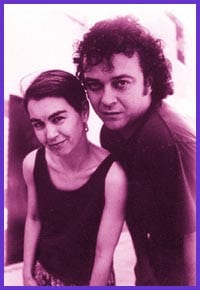“But I don’t even know you…,” she explained as she flagged a cab and slid into its vinyl womb. She was clearly trying to escape from me – but without humiliating me any more than I had managed to humiliate myself.
I was a shiny-faced teen, on a trip to the big city. That morning, I had received a hairdo that made me look like a pterodactyl, at the hands of the man I believed to be Carole Pope’s hairstylist – former hairstylist, as it turned out. Rats. Foiled again.
But here I was, in a chance meeting with Herself. I spotted Carole Pope on the street, followed her into Steve’s music store on Queen West. I waited, pretended to look at electronic gizmos. I followed her out. She held the door open for me. A real gentleman.
On the street I lost it. I prostrated myself before her, blurted out gibberish praise like the Holy Spirit was speaking through me. This is the point at which she flagged the cab.
I had experience with speaking in tongues. Back in my hometown of Thunder Bay, I spent one evening a week in a church basement, where my fellow charismatic Catholics employed a bizarre ritual to let fly all their repressed sexual urges and reviled exuberance about being alive.
As the cab fled, I slipped into a phone booth, rang my best friend and fellow Catholic back in Thunder Bay. He consoled me about her brush off. “She’s a lesbian, David.”
Later that week, a Rough Trade song came on the car radio as I motored along with a friend of the family. “Isn’t this your favourite band?” he asked. “She’s a lesbian,” I replied in the negative.
That night, the family friend seduced me. I played possum, feigned sleep during three rounds. “He’s just trying to confirm his suspicions about my predilections,” I thought. “Then he’ll expose me.” Such were the hyperactive levels of my paranoid defenses. I had already decided to live a chaste, stoic life masquerading as a heterosexual.
My dismissal of Carole Pope had exposed me as hateful. This man – intentionally or not – was teaching me a lesson. I learned it.
And so it was that she helped get me laid for the first time. But her influence on me wasn’t always so cheap. It was cheaper.
Carole Pope was the pied piper of perversity. She seduced the nation’s youth and struck a peculiar chord with young hinterland homos-to-be. From sea to shining sea, we responded with displays of hero worship unheard of in this country. My own shameless reverence aside, I know dykes who spent their high school years following her across Canada, showing up at literally every gig.
Rough Trade, assumed the domestic status, not of a hip indie band, but of chart-topping major stars. They were Canada’s spokesmodels for Pepsi, of all things, when Michael Jackson was the US equivalent. Contributing to CanCon quotas, the band’s singles were in heavy rotation on my local AM radio station. Over time, repeated exposure broke down my embrace of the Catholic death cult.
She was an equal opportunity icon: butch dyke and gay diva. She assumed masculine postures and lusted after schoolgirls, but her tastes were decidedly faggy: designer clothes, shoulder pads, big hair, cocked eyebrows and bitchy quips.
It had not occurred to me at first that she might be a lesbian. There was too much playful artifice and parody in her persona. Mind you, I thought she might be a man. In photos, she appeared hulking and large-featured. Her voice was beyond husky. It was suspect.
She was never in the closet. She was a courageous, sexually ambiguous rock star. We are accustomed to cowardly sexually ambiguous rock stars. Michael Stipe, in this day and age, still fears his queerness will interfere with his ability to make money. Marilyn Manson, perhaps more in tune with the times, knows he must affect queerness in order to make money.
Carole was coy, but she was neither avoidant nor exploitive. Sex talk was front and centre in her music and her interviews. Her lyrics were sometimes anthems, commanding us to “piss on our conditioning” and embrace “transexual erotica, role reversal, promiscuity.”
She displayed finesse in exploring homosexual depravity with Vinnie, the jealous gay lover who stabs Johnny, and is in turn suffocated by Eddy, in “Crimes Of Passion.” She wrote about human passions with an honesty that many gay people cannot bear to this day.
On the CBC, she once explained that the song “Sexual Outlaw” borrowed its name from a book popular in “certain circles.” Avant-garde circles, I thought, and not euphemistically. I honestly didn’t have a clue.
Carole brought gay, downtown Toronto culture to the rest of Canada, and sometimes things got lost in the translation. When she was blatant, her queerness was too unbelievable to be taken straight, so to speak. And when she used gay lingo, the colloquialisms were often lost on me.
But she drew me in, piqued my interest, tossed me clues and made me follow her scent. She was a skilled practitioner of classic homosexual camp. The in-jokes and triple entendres were artful and elitist, allowing teens in Hoo Haw, Manitoba to rise above their surroundings. It was sometimes smug, but mostly survivalist.
The Rough Trade phenomenon was extraordinary and subversive because it happened before media exploded, before alternative cultures went mainstream, before various sexualities were spoken of in every outpost, suddenly oblivious to geography.
It happened to me in a cruel city with two TV stations, at a time when I did not know what a homosexual was, despite being pegged as one by evil classmates.
Carole Pope sent signals. She gave me strength. And style. She saved my soul for sin.

 Why you can trust Xtra
Why you can trust Xtra


